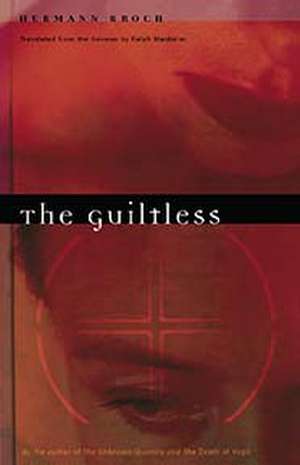The Guiltless
Autor Hermann Broch Traducere de Ralph Manheim Michael Hathawayen Limba Engleză Paperback – 26 dec 2000
Murder, lust, shame, hypocrisy, and suicide are at the center of The Guiltless, Hermann Broch's postwar novel about the disintegration of European society in the decades preceding the Second World War. Broch's characters--apathetic, cruel, or indolent--are trapped in their indifference, prisoners of a "wakeful somnolence." They may mention the "imbecile Hitler," yet they prefer sex or a nap to any social action. Broch thought such ethical perversity and political apathy paved the way for Nazism and hoped that by revealing Germany's underlying guilt he could purge indifference from his own and future generations. In The Guiltless, Broch captures how ennui--a very human failing--evolves into something dehumanizing and dangerous.
Preț: 110.90 lei
Nou
Puncte Express: 166
Preț estimativ în valută:
21.22€ • 22.22$ • 17.56£
21.22€ • 22.22$ • 17.56£
Carte indisponibilă temporar
Doresc să fiu notificat când acest titlu va fi disponibil:
Se trimite...
Preluare comenzi: 021 569.72.76
Specificații
ISBN-13: 9780810160781
ISBN-10: 0810160781
Pagini: 292
Dimensiuni: 140 x 216 x 20 mm
Greutate: 0.36 kg
Ediția:Translated
Editura: Northwestern University Press
Colecția Marlboro Press
ISBN-10: 0810160781
Pagini: 292
Dimensiuni: 140 x 216 x 20 mm
Greutate: 0.36 kg
Ediția:Translated
Editura: Northwestern University Press
Colecția Marlboro Press
Notă biografică
Hermann Broch (1886-1951) had careers as a mathematician, engineer, and director of a Viennese textile firm before publishing his first work, the trilogy Sleepwalkers, in 1930-32. In 1935 he spent 5 months in a Nazi prison; in 1940 he emigrated to the U.S.
Ralph Manheim has translated Danilo Kiš's Hourglass and Günter Grass's Tin Drum and has edited translated novels and plays by Bertolt Brecht, Hermann Hesse, and Erich Maria Remarque.
Ralph Manheim has translated Danilo Kiš's Hourglass and Günter Grass's Tin Drum and has edited translated novels and plays by Bertolt Brecht, Hermann Hesse, and Erich Maria Remarque.
Cuprins
Parable of the Voice
Voices: 1913
I. Sailing before a Light Breeze (1931)
II. Methodically Constructed (1917)
Voices: 1923
III. The Prodigal Son (1933)
IV. The Ballad of the Beekeeper
V. Zerline's Tale
VI. A Slight Disappointment (1933)
VII. Studienrat Zacharias's Four Speeches
VIII. Ballad of the Procuress
IX. The Bought Mother
Voices: 1933
X. The Commendatore
XI. Passing Cloud (1933)
How The Guiltless Came into Being
Voices: 1913
I. Sailing before a Light Breeze (1931)
II. Methodically Constructed (1917)
Voices: 1923
III. The Prodigal Son (1933)
IV. The Ballad of the Beekeeper
V. Zerline's Tale
VI. A Slight Disappointment (1933)
VII. Studienrat Zacharias's Four Speeches
VIII. Ballad of the Procuress
IX. The Bought Mother
Voices: 1933
X. The Commendatore
XI. Passing Cloud (1933)
How The Guiltless Came into Being
Recenzii
"[T]he greatest novelist European literature has produced since Joyce." --George Steiner
"Hermann Broch belongs in that tradition of great twentieth-century novelists who have transformed, almost beyond recognition, one of the classic art forms of the nineteenth century." --Hannah Arendt
Descriere
Murder, lust, shame, hypocrisy, and suicide are at the center of The Guiltless, Hermann Broch's postwar novel about the disintegration of European society in the decades preceding the Second World War. Broch's characters--apathetic, cruel, or indolent--are trapped in their indifference, prisoners of a "wakeful somnolence." They may mention the "imbecile Hitler," yet they prefer sex or a nap to any social action. Broch thought such ethical perversity and political apathy paved the way for Nazism and hoped that by revealing Germany's underlying guilt he could purge indifference from his own and future generations. In The Guiltless, Broch captures how ennui--a very human failing--evolves into something dehumanizing and dangerous.
